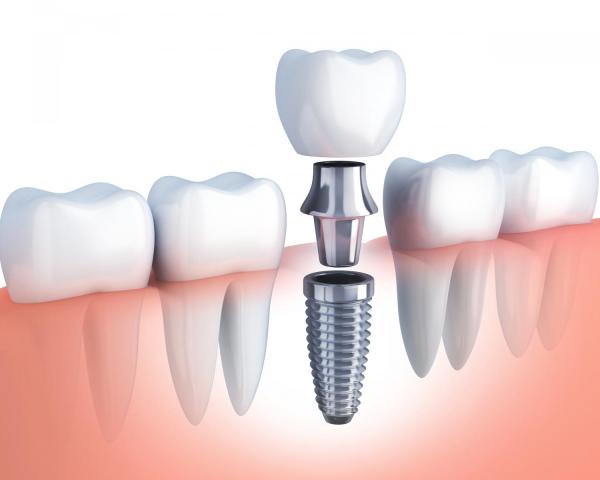
To help you decide on which treatment is best for you, you need to understand the differences between them and the advantages as well as the disadvantages of each solution.
A bridge entails placement of crowns on the two adjoining teeth, therefore, the procedure actually involves three teeth and not one tooth.
That is the big difference between bridge and dental implant; a single dental implant is independent from the adjacent teeth and it is treated separately. Placing a dental implant also helps preserve the bone; without an implant, the bone where there is a tooth missing will shrink over time which means it may not be possible to place an implant at a later date.
So if you opt to have a bridge first, with the idea of replacing it in a few years' time with an implant, it is likely that it will not be possible as the bone will have shrunk and will not be sufficient to support an implant.
One more advantage of a dental implant over a bridge is that it can actually look like it has grown from the gum, which means that it can really look like a natural tooth. This aesthetic aspect can sometimes be achieved with a bridge, but not in all cases.
Another aspect that may need to be considered is the condition of the teeth either side of the gap, if the teeth are in a poor condition and require crowning then it may be better to have a bridge.
The biggest advantage of a bridge over an implant is the time taken to complete the treatment; implant surgery requires several appointments over the space of a few months somtimes even up to one year, whereas a bridge requires 2-3 appointments over the space of a few weeks.
There are many differences between dental implants and bridge, and if you are deciding on which one to go for you must consider the following factors:
- Jaw Bone Restoration: Dental implants and bridges supported by implants are procedures that both involve placing implants in locations where there are missing teeth. By using implants, the bone is stimulated preventing long term bone loss. This makes dental implant a better choice because it prevents the bone from shrinking.
- Improved Oral Health: A bridge will require the adjacent teeth to support the entire bridge structure, while dental implants are independent and do not need support from its adjacent teeth. Therefore dental implants do not have any adverse effects on the natural teeth.
- Durability and Stability: Both dental implants and bridges offer a long term fixed solution to missing teeth. The placement of a bridge uses the neighboring teeth as supports; over the years this puts additional strain on the supporting teeth which may decrease their life expectancy. On the other hand dental implants are embedded into the jaw bone and are similar to the natural root of the tooth. The life expectancy of a bridge on natural teeth is between 10 – 20 years and then may require changing, or until such time that one of the supporting natural teeth under the bridge becomes weakened and is no longer able to function as an anchor.
- Aesthetic Factor: For some people, they want their dental solutions to look as natural as their own healthy teeth. If that is your case, then your best option is have dental implants because they can look exactly like your natural teeth. That is why people always choose dental implants rather than bridges, even though the latter is much cheaper than the former.
In summary, the advantage of a dental bridge is its cheaper, quicker and is a less invasive treatment; on the other hand dental implants are more durable, do not require healthy teeth to be filed, have a better aesthetical result and in general provide a better long term solution.


